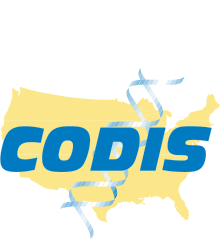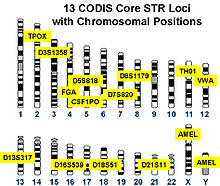- Combined DNA Index System
-
The Combined DNA Index System (CODIS) is a DNA database funded by the United States Federal Bureau of Investigation (FBI). It is a computer system that stores DNA profiles created by federal, state, and local crime laboratories in the United States, with the ability to search the database to assist in the identification of suspects in crimes.[1]
Contents
Origins
CODIS was an outgrowth of the Technical Working Group on DNA Analysis Methods (TWGDAM, now SWGDAM) which developed guidelines for standards of practice in the United States and Canadian crime laboratories as they began DNA testing in the late 1980s.
TWGDAM was sponsored by the FBI Laboratory which hosted several scientific meetings a year at Quantico, Virginia, to accelerate development of laboratory guidelines and peer-reviewed papers to support forensic DNA testing which was, to some, an unproven forensic tool. TWGDAM completed a white paper in October 1989 which provided conceptual and operational concepts for a Combined DNA Index System to share DNA profiles among crime laboratories similarly to automated fingerprint identification which had become commonplace in law enforcement during the 1980s.
The FBI Laboratory began a pilot project with six state and local crime laboratories to develop software to support each laboratory's DNA testing and allow sharing of DNA profiles with other crime laboratories.
The DNA Identification Act of 1994 formally authorized the FBI to operate CODIS and set national standards for forensic DNA testing. The TWGDAM guidelines served as interim standards until recommendations were provided by a DNA Advisory Board required under the Act. Although the Act was passed in 1994, CODIS did not become fully operational until 1998.
Markers
CODIS identifies 13 markers, plus AMEL to determine sex:[2]
- CSF1PO
- D3S1358
- D5s818
- D7s820
- D8S1179
- D13s317
- D16s539
- D18s51
- D21s11
- FGA
- THO1
- TPOX
- vWA
These markers do not overlap with the ones commonly used for genealogical DNA testing. Some may be indicative of genetic diseases.[3]
Indexes and database structure
CODIS is an index of pointers to assist US public crime laboratories to compare and exchange DNA profiles. A record in the CODIS database, known as a CODIS DNA profile, consists of an individual's DNA profile, together with the sample's identifier and an identifier of the laboratory responsible for the profile. CODIS is not a criminal history database, like the National Crime Information Center (NCIC), and does not contain any personal identity information, such as names, dates of birth, and social security numbers.
Originally, CODIS consisted of the Convicted Offender Index and the Forensic Index, but in recent years, the Arrestee Index, the Missing or Unidentified Persons Index, and the Missing Persons Reference Index have been added. The Convicted Offender Index contains profiles of individuals convicted of crimes. State law governs which specific crimes are eligible for CODIS. (All 50 states have passed DNA legislation authorizing the collection of DNA profiles from convicted offenders for submission to CODIS.) The Forensic Index contains profiles developed from biological material found at crime-scenes.
CODIS has a matching algorithm that searches the various indexes against one another according to strict rules that protect personal privacy. For solving rapes and homicides, for example, CODIS searches the Forensic Index against itself and against the Offender Index. A Forensic to Forensic match provides an investigative lead that connects two or more previously unlinked cases. A Forensic to Offender match actually provides a suspect for an otherwise unsolved case. It is important to note that the CODIS matching algorithm only produces a list of candidate matches. Each candidate match is confirmed or refuted by a Qualified DNA Analyst. (To become Qualified, a DNA Analyst must meet specific education and experience requirements and undergo semi-annual proficiency tests administered by a third party.)
CODIS databases exist at the local, state, and national levels. This tiered architecture allows crime laboratories to control their own data—each laboratory decides which profiles it will share with the rest of the country. As of 2006, approximately 180 laboratories in all 50 states participate in CODIS. At the national level, the National DNA Index System, or NDIS, is operated by the FBI at an undisclosed location.
Relative size
As of October 2007, CODIS held 194,785 forensic profiles and 5,070,473 offender profiles,[4] making it the largest DNA database in the world, surpassing the United Kingdom National DNA Database, which consisted of an estimated 3,976,090 profiles as of June 2007.[5] As of the same date, CODIS has produced over 49,400 matches to requests, assisting in more than 50,343 investigations.[6]
By October 2008, the US National DNA Index (NDIS) has grown to over 241,685 forensic profiles and 6,384,379 offender profiles. As of July 2009, CODIS has produced over 94,000 hits assisting in more than 93,000 investigations.[7]
The growing public approval of DNA databases has seen the creation and expansion of many states' own DNA databases. California currently maintains the third largest DNA database in the world. Political measures such as California Proposition 69 (2004), which increased the scope of the DNA database, have already met with a significant increase in numbers of investigations aided.
In order to decrease the number of irrelevant matches at NDIS, the Convicted Offender Index requires all 13 CODIS STRs to be present for a profile upload. Forensic profiles only require 10 of the STRs to be present for an upload.
Controversies
Privacy concerns
The CODIS database originally was primarily used to collect DNA of convicted sex offenders. Over time, this has expanded. Currently all fifty states have mandatory DNA collection from certain felony offenses such as sexual assault and homicide, and 47 states collect DNA from all convicted felons.[citation needed] Other states have gone further in collecting DNA samples from juveniles and all suspects arrested. In California, as a result of Proposition 69 in 2004, all suspects arrested for a felony, as well as some individuals convicted of misdemeanors, will have their DNA collected starting in 2009. In addition to this, all members of the US Armed Services who are convicted at a Special court martial and above are ordered to provide DNA samples, even if their crime has no civilian equivalent (for example adultery).
Currently, the ACLU is concerned with the increased use of collecting DNA from arrested suspects rather than DNA testing for convicted felons. Along with the ACLU, civil libertarians oppose the use of a DNA database for privacy concerns as well as possible institutionalized discrimination policies in collection.
In popular culture
In forensics television series such as CSI, Bones, NCIS, Numb3rs, Criminal Minds, Law & Order: SVU, and Dexter, the investigators often match DNA with the CODIS database.
See also
References
- ^ "Mission". Fbi.gov. http://www.fbi.gov/hq/lab/html/codis1.htm. Retrieved September 18, 2011.
- ^ "learn about dna : glossary : CODIS markers". Dnaconsultants.com. http://dnaconsultants.com/Detailed/335.html. Retrieved September 18, 2011.
- ^ USA (August 26, 2011). "Association of the tyrosine hydroxylase gene polymorphism with schizophrenia in the population of central Poland". Ncbi.nlm.nih.gov. http://www.ncbi.nlm.nih.gov/pubmed/19189602. Retrieved September 18, 2011.
- ^ CODIS – National DNA Index System[dead link]
- ^ Department of the Official Report (Hansard), House of Commons, Westminster. "House of Commons Hansard Written Answers for 20 Jun 2007 (pt 0037)". Publications.parliament.uk. http://www.publications.parliament.uk/cgi-bin/newhtml_hl?DB=semukparl&STEMMER=en&WORDS=ndnad&ALL=&ANY=&PHRASE=&CATEGORIES=&SIMPLE=ndnad&SPEAKER=&COLOUR=red&STYLE=s&ANCHOR=70620w0037.htm_spnew5&URL=/pa/cm200607/cmhansrd/cm070620/text/70620w0037.htm#70620w0037.htm_spnew5. Retrieved September 18, 2011.
- ^ Investigations Aided[dead link]
- ^ CODIS—NDIS Statistics[dead link]
External links
- CODIS homepage
- "ACLU Warns of Privacy Abuses in Government Plan to Expand DNA Databases". ACLU. March 1, 1999.
- A Not So Perfect Match, CBS, 2007
- "Anne Pressly: Detailed Cases and Informed Opinions On DNA". December 4, 2008.
- "DNA didn't prove anything, as it only had five points out of 13. Juror Explains Verdict In Double Murder". November 13, 2008. (As of 20111024, this appears to be a dead link.)
Categories:- Biometrics
- DNA
- Federal Bureau of Investigation
- Law enforcement databases in the United States
- Personal identification documents
- Sex offender registration
Wikimedia Foundation. 2010.


